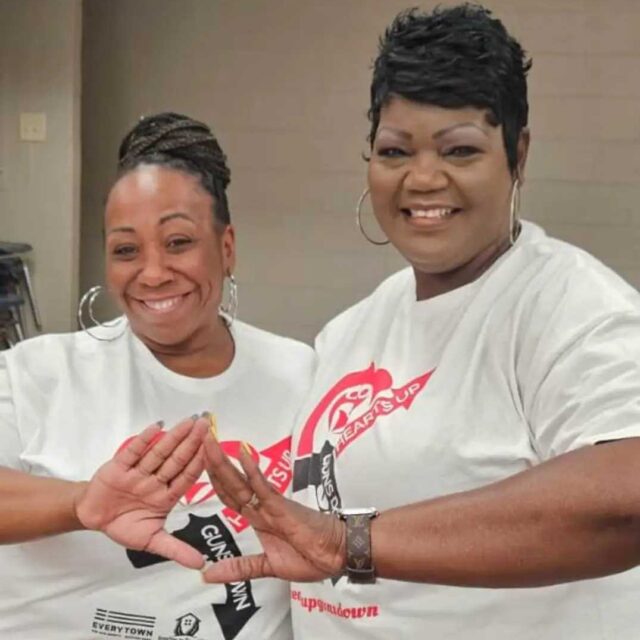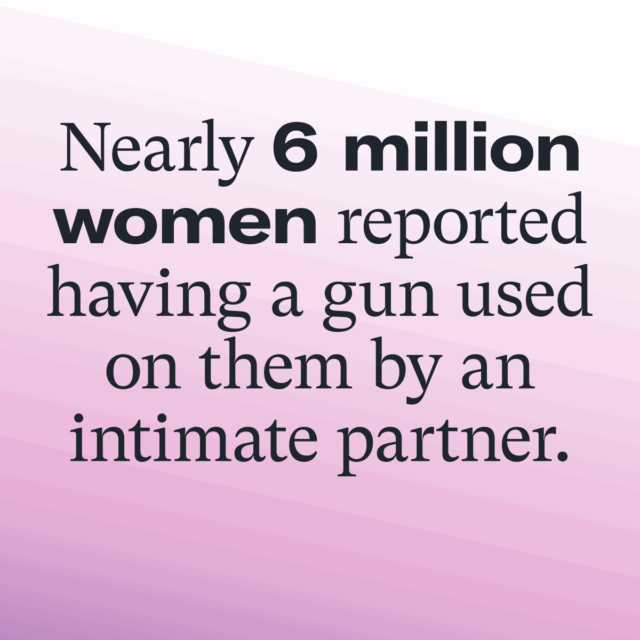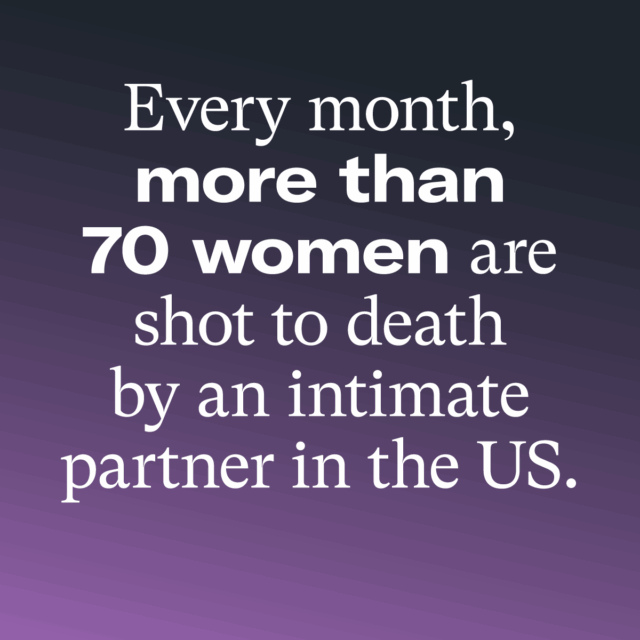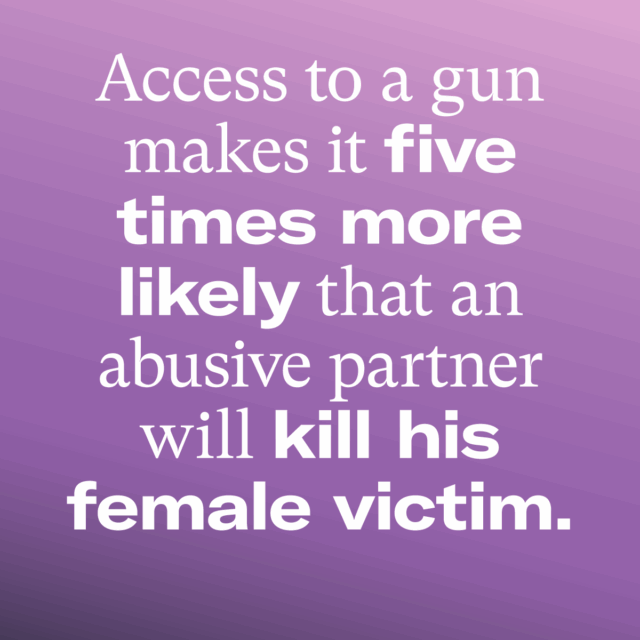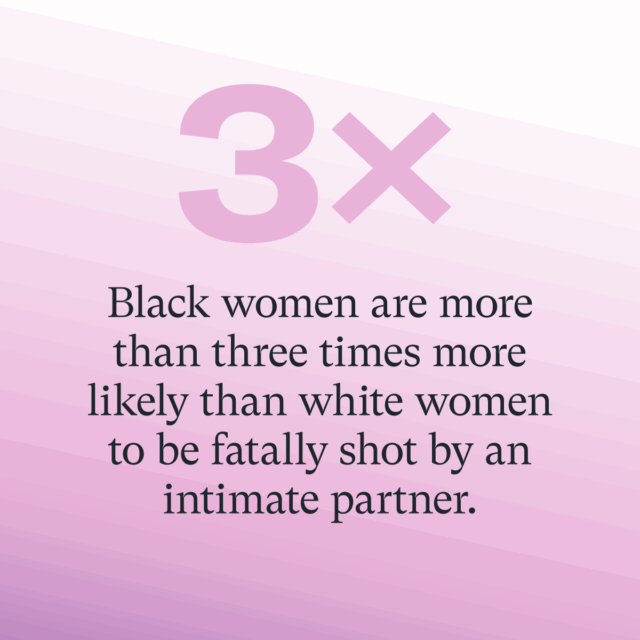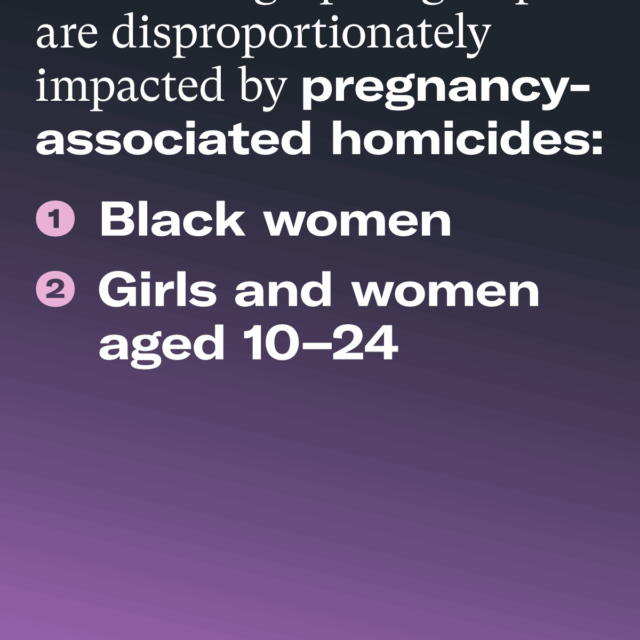October Is Domestic Violence Awareness Month
October is Domestic Violence Awareness Month, an opportunity to remember victims and survivors, raise awareness of what domestic violence is, how to recognize it, and what can be done to prevent it.
>70
Every month, an average of more than 70 women are shot and killed by an intimate partner.
Everytown Research analysis of CDC, National Violent Death Reporting System (NVDRS), Average: 2020–2022. Analysis includes firearm homicides involving an intimate partner and women ages 18–85+.
Last updated: 5.27.2025
5x
Access to a gun makes it five times more likely that a woman will die at the hands of a domestic abuser.
Jacquelyn C. Campbell et al., “Risk Factors for Femicide in Abusive Relationships: Results From a Multisite Case Control Study,” American Journal of Public Health 93, no. 7 (July 2003): 1089–97, https://doi.org/10.2105/AJPH.93.7.1089
6M
Nearly 6 million women reported having a gun used on them by an intimate partner.
Ruth W. Leemis et al., “The National Intimate Partner and Sexual Violence Survey: 2016/2017 Report on Intimate Partner Violence,” Centers for Disease Control and Prevention, October 2022, https://stacks.cdc.gov/view/cdc/124646. 4.7 percent of women (5.9 million) in the U.S. reported having a gun used on them by a current or former intimate partner at some point in their lifetime. While the survey question is up for interpretation by respondents and doesn’t provide further breakdowns, this count likely includes cases of being shot or shot at, hit with, and threats with a firearm.
Every month, more than 70 women in the US are shot and killed by an intimate partner1Everytown Research analysis of CDC, National Violent Death Reporting System (NVDRS), Average: 2020–2022. Analysis includes firearm homicides involving an intimate partner and women 18 years and older. and nearly 6 million women reported having a gun used on them2While the survey question is up for interpretation by respondents and doesn’t provide further breakdowns, this count likely includes cases of being shot or shot at, hit with, and threats with a firearm. by an intimate partner.34.7 percent of women (5.9 million) in the United States reported having a gun used on them by a current or former intimate partner at some point in their lifetime.Ruth W. Leemis et al., “The National Intimate Partner and Sexual Violence Survey: 2016/2017 Report on Intimate Partner Violence,” Centers for Disease Control and Prevention, October 2022, https://stacks.cdc.gov/view/cdc/124646. Research clearly shows that disrupting abusers’ access to guns can save lives.
National Domestic Violence Hotline
If you or someone you know is experiencing domestic violence, please contact the National Domestic Violence Hotline by calling 1-800-799-SAFE (7233), texting “START” to 88788, or chatting online at thehotline.org. Trained advocates are available 24/7 to provide free confidential support to people anywhere in the US.
You can also find more resources on legal assistance in English and Spanish at WomensLaw.org. For additional resources on the emotional, medical, financial, and legal consequences of gun violence for individuals and communities, please visit Everytown’s Resources page.
Click here for additional resources for survivors of domestic violence and intimate partner violence.
This month, help raise awareness of intimate partner violence by sharing resources and shining a light on prevention.
Domestic violence, also known as intimate partner violence, can take many forms. Understanding the behaviors that define domestic violence is a crucial way to take part in prevention and assist others in crisis.
Defining the Problem
-
Guns Can Turn Domestic Violence Deadly
Domestic violence and gun violence are deeply interconnected, impacting millions across the US. Guns are more likely to turn abuse fatal.
-
Guns and Violence Against Women
Abusers with firearms are five times more likely to kill their female victims, and guns further exacerbate the power and control dynamic used by abusers.
-
Dual Tragedies: Intimate Partner Homicide-Suicide
On average, more than once per day in the US, a tragedy occurs where a perpetrator kills an intimate partner, and then dies by suicide themself.
All forms of intimate partner violence are preventable. Common-sense laws that keep guns out of the hands of abusive partners can help to reduce it.
Addressing Solutions
-
Require background checks for all gun sales
Background checks are the foundation of any comprehensive gun violence prevention strategy.
-
Close the Charleston Loophole
Closing the Charleston Loophole would ensure that no firearm is sold with an incomplete background check.
-
Prohibit people with dangerous histories from having guns
Federal law should be amended to fill dangerous gaps in the law that enable people with dangerous histories to have guns.
-
Require prohibited people to turn in their guns
Relinquishment laws enforce existing laws that prohibit certain categories of people with dangerous histories from having guns.
-
Ensure effective implementation of laws that disarm domestic abusers
Laws that prohibit domestic abusers from gun possession must be effectively implemented to protect survivors and communities from future gun violence.
Domestic Violence Grant Program
Through our Domestic Violence Grant Program, organizations across the country can access funding. These grants support activities related to addressing the intersection of domestic violence and gun violence.
Learn MoreMoments That Survive
During Domestic Violence Awareness Month, read and share the stories of domestic violence survivors.
Read MoreMore Resources
-
Everytown Resource Guide for Survivors of Domestic and Intimate Partner Violence
-
Victims of Crime Act (VOCA) Assistance Funding
-
Hurdles to Healing: Fixing Victim Compensation Funds
-
Domestic Violence Danger and Lethality Assessment Protocols
-
Disarming Domestic Abusers
-
Community-Led Services for Survivors
-
Misogyny, Extremism, and Gun Violence
-
Freedom from Fear of Hate-Fueled Violence: Preventing Transgender Homicides
-
Domestic Violence and Firearm Surrender in Rhode Island
-
Beyond Measure: Gun Violence Trauma





